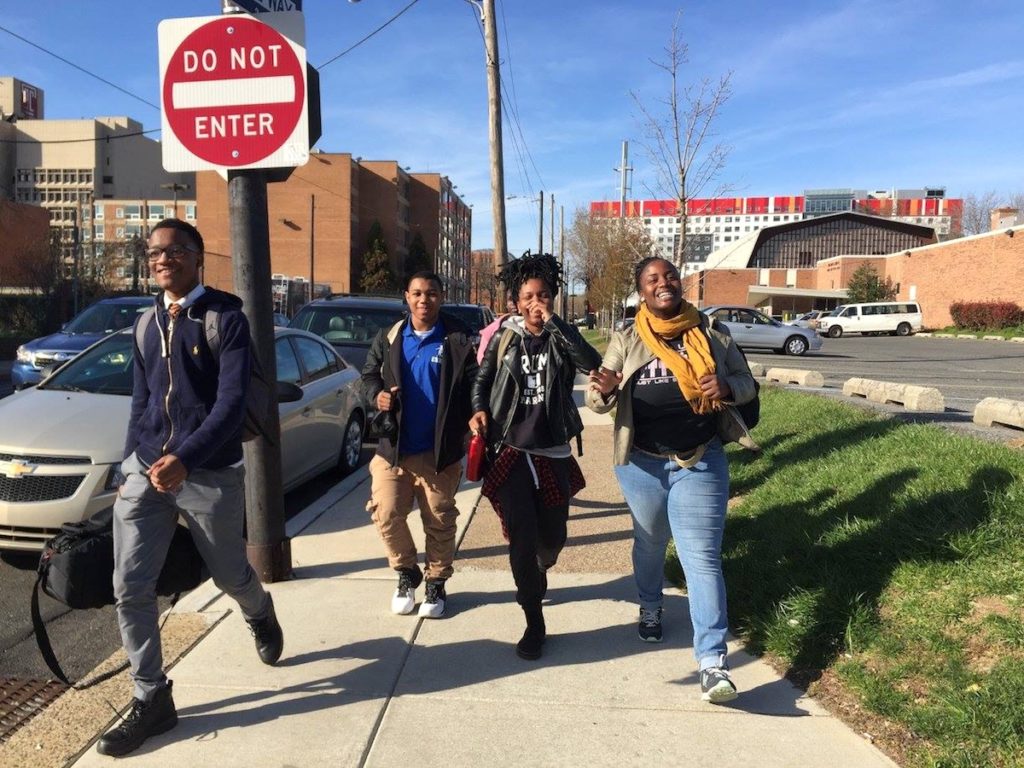POPPYN’s video report on foster care in Philly is making waves at DHS
 February 1, 2017
Category: Feature, Featured, Medium, Results
February 1, 2017
Category: Feature, Featured, Medium, Results
When Josh Childs’ father saw POPPYN’s episode on the Black Lives Matter movement, he told Josh he wasn’t a kid anymore.
“He accepted me for my knowledge and didn’t make me be quiet,” said Childs, a junior at Science Leadership Academy who coproduced the episode.
POPPYN, or Presenting Our Perspective on Philly Youth News, is a program that gives Philadelphia high school students the chance to tell their side of the story on a topic of interest through visual media.
For their latest episode, students tackled several problems within the city’s foster care system and caught the attention of Philadelphia’s Department of Human Services Commissioner Cynthia Figueroa. The students will show the episode to City Council in February in the hopes of sparking some reform in the system.
During the school year, high school students meet on Temple University’s main campus to work on interview, research and video production skills. The students create four episodes per year, which can be viewed weekly on PhillyCAM, the city’s public access network.
Kayla Watkins, a media facilitator for POPPYN, said the idea for the foster care episode came straight from the high school students’ experiences.
“Lots of our students were in foster care or had family in foster care,” said Watkins, who added that most of the young adults who are interviewed in the episode about their foster care experiences are POPPYN students. “So they really cared about it and really wanted to delve into the issues with Philadelphia’s DHS system.”
Throughout the 40-minute video, the students interviewed and discussed several organizations that work with foster youth. They opened the episode with statistics from DHS.
In 2015, there were 5,948 youth in foster care, a group home or kinship care, which was up 774 since 2014, according to POPPYN and a Philly.com article from last year.
“They do weeks of research, go to different databases, and find informative, but short statistics people will remember,” Watkins said. “A lot of people remember the number of foster care youth in Philadelphia and remembered how many foster care youth are harmed.”
Watkins added that this segment was significantly challenging since it was tackling an issue that is particular to Philadelphia, rather than other episodes, which deal with broader issues such as Islamophobia. She said it was important for the students to set a goal.
“They said, ‘we want DHS to realize what is happening in their own system,’” Watkins said. “‘We want people to realize that foster care youth do not have a venue for getting their experiences and opinions out in a way that is safe, and we want more people to foster youth.”
The video goes on to tell the personal foster care stories of students, including Childs, who spent most of his childhood in the foster care system.
“With my DHS worker, they would never come to check up on me to see how I was doing or whatever,” Childs says in the video.“Whenever my foster parents would call them about something bad I was doing, that was then they would show up and place the blame on me.”
The episode also profiles several organizations and programs within the foster care system, like Youth Emergency Services and Youth Fostering Change.
After the episode was published in late October, it piqued Figueroa’s interest.
“I don’t think anybody in this field is unanimous in thinking things are perfect, so hearing the issues they face and what is important to them when they are in care,” Figueroa said, “that gives leaders a perspective on what they need to be working on and talking to students about.”
On Jan. 18, POPPYN students screened the episode for DHS “community umbrella organization” NET Community Care, which works directly with case management.
Childs said he hopes the February screening for City Council will spur some positive change.
“I am hoping to push the City Council members to fund the foster care program a little more because they can’t make all these changes out of thin air,” Childs said. To make said change, the city needs “to fire people, you have to hire people. It’s a work in progress and we need people to work with us.”
Watkins added that POPPYN episodes like these allow kids in Philadelphia to have a stronger voice in the situations that are actively affecting them. For the students, the Black Lives Matter episode and the foster care episode were ways for them to voice how they often felt marginalized.
“I think giving them the agency to choose what topics they talk about helps them feel that their voices matter,” Watkins said. “If you give them the tools to break down the media they consume, they’ll be able to have informed opinions on anything they get in contact with.”
Project
POPPYNTrending News










